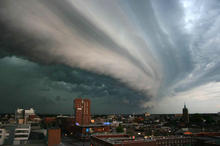
Don’t let this dangerous season catch you unaware.
Be prepared!
- SAFE AREAS - Take a moment to figure out where they are at home and on campus.
- FLASHLIGHT - Install fresh batteries & keep easily accessible in case of power outage.
- PORTABLE WEATHER ALERTS - Often, severe weather occurs when we are away from our stationary Weather Alert Radio. Consider a Severe Weather Warning App for your mobile phone. WHIO-TV offers a free local weather app that will audibily alert you for any storm warnings you choose. Even when your phone is silenced, it will push an alert to you. Click here for details.
- BATTERY OPERATED RADIO - for when the mobile phone runs out of power.
WSU Campus Tips
For more excellent tips and information specific to our campus, please check out the following links:
In the case of severe weather, remember the following:
- GET IN - If you are outside, get inside. If you're already inside, get as far into the middle of the building as possible.
- GET DOWN - Get underground if possible. If you cannot, go to the lowest floor possible.
- COVER UP - Flying and falling debris are a storm's number one killer. Use pillows, blankets, coats, helmets, etc to cover up and protect your head and body from flying debris.
The following advice is brought to you by NOAA.
1. Know Your Risk
Tornadoes, floods, thunderstorm winds, hail, lightning, heat, wildfires, rip currents and tsunamis can be a killer for the unprepared. Here’s what you need to know about these dangerous hazards:
- Since 2003, 43 states within the continental United States have come under a tornado watch; 49 states have come under severe thunderstorm watches; and lightning strikes occur in every state.
- More than half of the total freshwater flood-related deaths each year result from motorists driving into floodwaters. It only takes 12 inches of water to carry off a small vehicle.
- Heat is one of the leading weather-related killers in the United States, resulting in hundreds of deaths each year. The heat wave of 1995 claimed more than 700 lives in the Chicago area alone.
- In 2014, there were 26 lightning fatalities - six in Florida alone.
- Wildfires kill 30 people, destroy 2,800 homes and burn more than 7 million acres, on average per year.
- The United States Lifesaving Association estimates that more than 100 people each year die in the surf zone waters of the U.S. and that rip currents cause the majority of those fatalities.
- Since the beginning of the 20th century, 34 tsunami events have caused more than 500 deaths and over $1.7 billion (2014 dollars) in damage to U.S. coastal states and territories.
2. Take Action
While the weather may be wild, you are not powerless. Prepare for spring hazards including tornadoes, floods, thunderstorm winds, hail, lightning, heat, wildfires, rip currents and tsunamis with these simple steps:
- You may have only minutes to find shelter before a tornado strikes. Practice a family tornado drill at least once a year.
- Whether driving or walking, any time you come to a flooded road, Turn Around Don't Drown®.
- Check to see if officials in charge of sports have a written lightning safety place
- Extreme heat comes early to the Southwest. During a heat wave, reschedule strenuous outdoor activities for the coolest time of the day.
- If you live near wildland areas, make sure you home is Firewise and fire-safe.
- This spring break, avoid rip currents by checking the local beach forecast and talking to the lifeguard.
- If you live, work or play on the coast, learn about tsunami safety.
3. Be a Force of Nature
Being prepared is about helping your community. Share your weather and emergency preparedness story and you’ll inspire others to prepare.
- Write a post on Facebook. Share with your friends and family the details of how you’re weather-ready.
- Tweet that you’re prepared with #SpringSafetyPrep. Help us build an online community of the prepared.
- Create a Family Communication Plan so that your loved ones know how to get in touch during an emergency. And let your friends know that they should create a plan also.
- Look for ways to help your town prepare, such as volunteering with the American Red Cross or joining a Community Emergency Response Team.
- Register for America’s PrepareAthon! to learn how to stay safe during disasters.
These simple steps will help keep you safe from tornadoes, floods, lightning, heat, wildfires, rip currents and tsunamis. A little bit of preparation can make a big difference. And being ready for these hazards will help you throughout the year.

